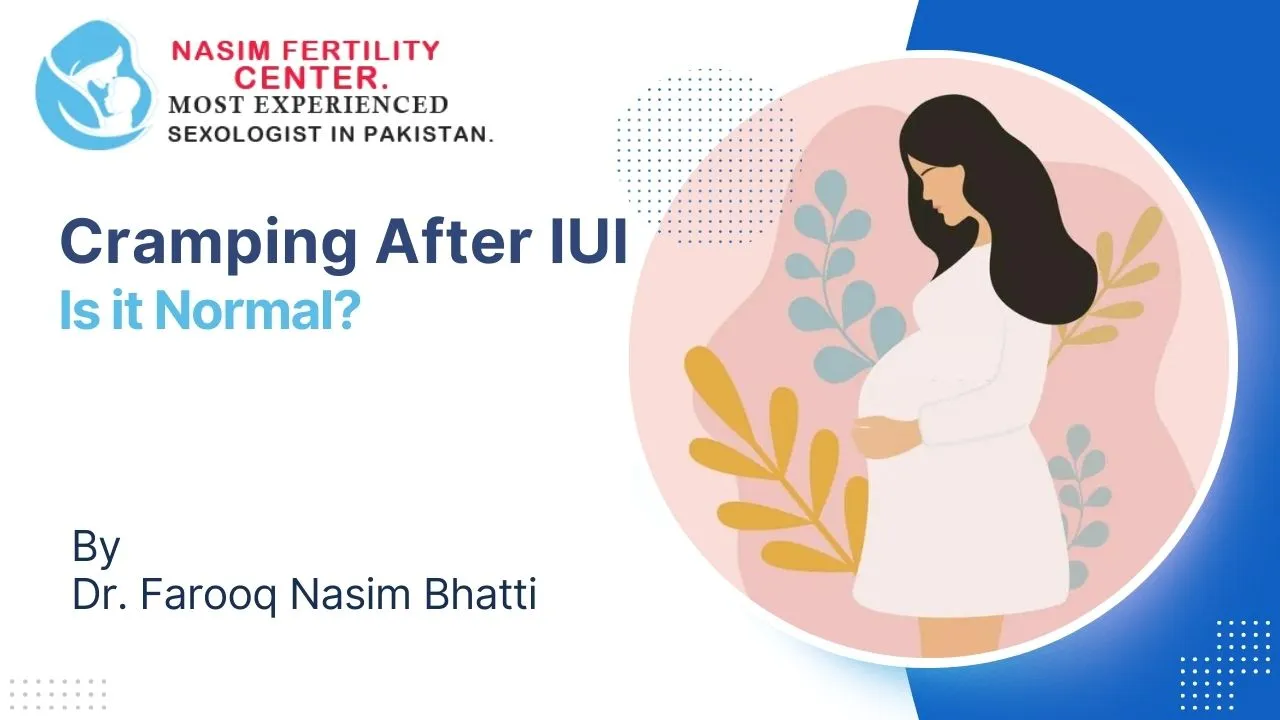
Intrauterine Insemination (IUI) is a commonly used fertility treatment for couples struggling to conceive. While it offers hope and the possibility of parenthood, it also comes with its own set of concerns and potential side effects. One of the frequently asked questions by women undergoing IUI is about cramping after the procedure.
This blog aims to provide a comprehensive understanding of cramping post-IUI, exploring whether it is normal, its causes, and when it might be a sign of something more serious.
What are Cramps? Cramps refer to sudden, involuntary muscle contractions that can cause pain and discomfort. These can occur in various parts of the body, but when discussing IUI, we are primarily referring to abdominal or pelvic cramps.
The symptoms of cramps include sharp pain, dull aches, or a feeling of tightness in the affected area. These symptoms can vary in intensity and duration, sometimes lasting just a few minutes or persisting for several hours.
What to Expect During an IUI
Understanding the IUI process can help demystify some of the physical sensations experienced afterward. During IUI, sperm is directly placed into a woman’s uterus around the time of ovulation. This procedure involves several steps, including:
- Ovarian Stimulation: Medications may be given to stimulate the ovaries to produce multiple eggs.
- Monitoring: Ultrasounds and blood tests are used to monitor the development of the follicles.
- Sperm Collection and Preparation: The male partner provides a sperm sample, which is then washed and concentrated.
- Insemination: A thin catheter is used to place the prepared sperm directly into the uterus.
The procedure is generally quick and minimally invasive, but it can still cause some discomfort.
Kya aap infertility ya pregnancy mein mushkilat ka samna kar rahe hain?
Consult karein Dr. Farooq Nasim Bhatti se Jo Pakistan ke leading fertility expert jo IUI Treatment mein mahir hain.

Is Cramping Normal After IUI?
Cramping after IUI is not typically considered normal. While mild discomfort can be expected due to the procedure itself, significant cramping may indicate other underlying issues.
It’s essential to distinguish between the normal discomfort associated with IUI and abnormal cramping that could signal complications.
Causes of Cramping After IUI
Several factors can contribute to cramping after IUI. These include:
- Procedure-Related Discomfort: The IUI procedure can cause minor irritation to the uterine lining, leading to mild cramps.
- Ovarian Hyperstimulation Syndrome (OHSS): This condition can occur if the ovaries respond too vigorously to fertility medications, causing them to swell and become painful.
- Uterine Contractions: Sometimes, the uterus may contract in response to the catheter used during the IUI procedure, resulting in cramps.
- Infection: Although rare, an infection could develop after IUI, causing pain and cramping.
- Implantation: If the IUI is successful, cramping could be an early sign of implantation as the embryo attaches to the uterine lining.
What Are the Early Signs of a Failed IUI?
While it’s natural to hope for the best, it’s also essential to recognize the signs that an IUI may not have been successful. Early indicators of a failed IUI can include:
- No Changes in Basal Body Temperature: A continued lack of rise in basal body temperature might indicate that implantation has not occurred.
- Menstrual Period: The onset of a menstrual period is the most apparent sign that the IUI has failed.
- Negative Pregnancy Test: A negative result on a pregnancy test taken two weeks after IUI typically indicates failure.
When Cramping Could Be a Cause for Concern
Cramping after IUI can be concerning if it is severe, persistent, or accompanied by other symptoms. Warning signs to watch for include:
- Severe Pain: Intense pain that doesn’t subside could indicate a serious problem.
- Heavy Bleeding: Spotting can be normal, but heavy bleeding is a red flag.
- Fever: A fever might indicate an infection and requires immediate medical attention.
- Dizziness or Fainting: These symptoms could be signs of an ectopic pregnancy or other complications.
When Should a Doctor Be Approached?
It’s crucial to contact your healthcare provider if you experience any of the concerning symptoms mentioned above. Early intervention can prevent complications and ensure proper care. Regular follow-ups and open communication with your doctor are essential during fertility treatments like IUI.
Treatment from IUI Expert in Pakistan
If you are experiencing cramping or other symptoms after IUI, seeking treatment from an expert is essential. Dr. Kiran Khurshid, MBBS, FCPS, Professor of Gynecology and Obstetrics at Lady Lady Willingdon Hospital, Lahore, along with Dr. Farooq Nasim Bhatti MBBS, FAACS (USA), Diplomate of the American board of Sexology (USA), CST, HSC (Hong Kong), CART (MALAYSIA), CART (CHINA), a renowned sexologist and IUI expert in Pakistan, offers comprehensive care and treatment.
As a Expert Sexologist in Pakistan, He has clinics in Lahore, Islamabad, and Faisalabad, Dr. Farooq Nasim Bhatti provides expert consultations and personalized treatment plans to address any complications arising from IUI procedures.
Conclusion
Cramping after IUI is not typically normal and can be caused by various factors ranging from minor procedural discomfort to more serious conditions like OHSS or infections. Recognizing the signs and symptoms of complications is crucial for timely intervention. Always consult with a healthcare provider if you experience severe or persistent cramping post-IUI.
With the right care and expert guidance from professionals like Dr. Farooq Nasim Bhatti, you can navigate the challenges of fertility treatments more confidently.
Frequently Asked Questions
Is cramping normal after IUI?
While mild discomfort is expected, significant cramping is not considered normal and should be discussed with a doctor.
What causes cramping after IUI?
Causes can include procedural discomfort, ovarian hyperstimulation syndrome (OHSS), uterine contractions, infection, or implantation.
When should I contact a doctor about cramping after IUI?
Contact a doctor if you experience severe pain, heavy bleeding, fever, or dizziness.
What are the early signs of a failed IUI?
Signs include no changes in basal body temperature, the onset of a menstrual period, and a negative pregnancy test.
Can cramping after IUI be treated?
Yes, treatment depends on the underlying cause and may include medications, lifestyle changes, or medical interventions from a specialist.
Who is the best IUI expert in Pakistan?
Dr. Farooq Nasim Bhatti is a highly regarded IUI expert in Pakistan, with extensive experience and clinics in Lahore, Islamabad, and Faisalabad.
By understanding the potential causes and implications of cramping after IUI, you can take proactive steps to ensure your reproductive health and seek the appropriate care when necessary.
Disclaimer
This information is for educational purposes and not the treatment. For treatment, you need to consult the doctor.

Dr. Farooq Nasim Bhatti (MBBS, FAACS – USA, Diplomate: American Board of Sexology, CST, HSC – Hong Kong, CART – Malaysia & China) is a qualified medical sexologist with 30+ years of experience. He has presented 21+ research papers internationally and treats sexual dysfunction through sex therapy, counseling, and pharmacotherapy to restore natural sexual function without temporary medication.

Regain Confidence with Our ED Solutions
Explore effective treatments for erectile dysfunction. Take charge of your intimacy today.


